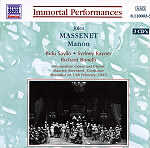Bidú Sayao was a world-famous Manon, and this performance, her debut at New York’s Metropolitan Opera in February of l937, makes clear why. She temperamentally embodies the coquettish, seemingly innocent, wayward, loving character ideally and vocally the role fits her like a glove. Her seduction of Des Grieux – which Manon does over and over again – is varied and infinitely convincing; she melts the heart in the beautiful St. Sulpice scene. Her partner here is the little-known Sydney Rayner (filling in for an indisposed Richard Crooks), and he’s a brilliant surprise. The voice rings brightly and freely, his diction is superb, but why he entirely misses the opportunity to milk a tear from the audience during his beautiful “Reve,” instead singing it as if it were a national anthem, this must remain a mystery. The remainder of the cast is good, and conductor Abravanel leads a somewhat re-arranged edition of the score with great insight. The sound is tolerable, and the last 50 minutes of the third CD contains a series of songs, arias and duets starring Sayao, but there are no explanations or track listings. A very worthy Manon. (Editor’s Note: Not available for sale in the U.S.A.)
































